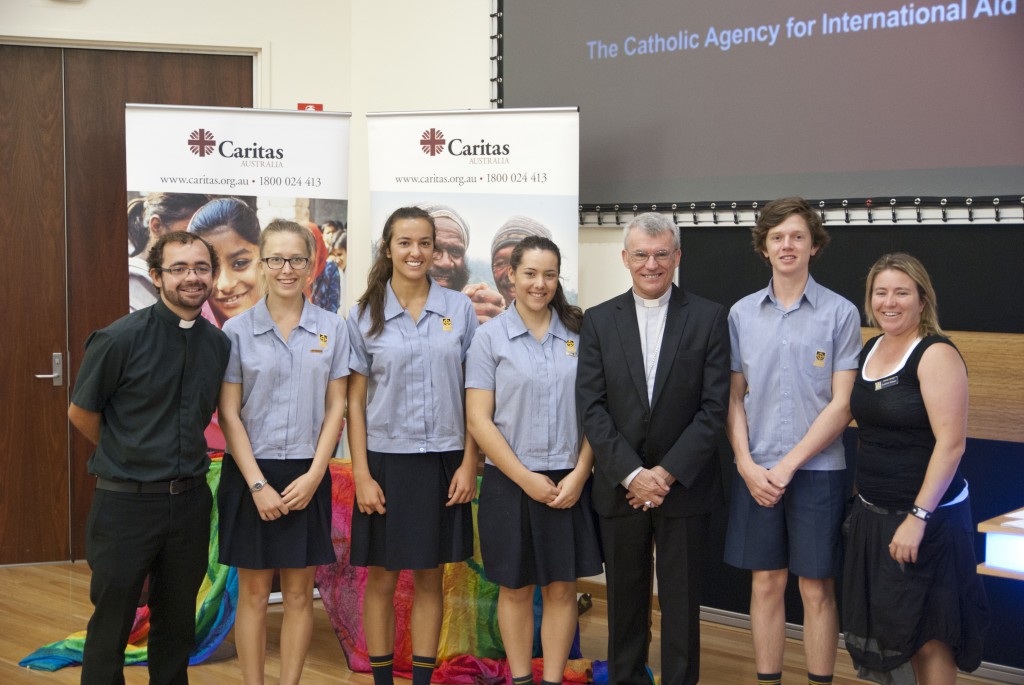
Student leaders from 15 Catholic high schools throughout Perth heard about the paradoxical nature of Christian leadership from none other than the city’s chief Catholic pastor, Archbishop Timothy Costelloe SDB on February 20.
Archbishop Costelloe spoke on the topic “Youth leading for justice: Catholic leadership for the 21st century” as part of Caritas Australia’s Just Leadership Workshop at John XXIII College, Mt Claremont.
Utilising quotes from figures both historical and literary, including Nelson Mandela, St Francis de Sales and Frodo Baggins, the Archbishop developed a picture of what good leadership looked like, before nominating what set Christian leadership apart.
“One of the qualities of a good leader is that a leader doesn’t stifle or squash the enthusiasm or limit the vision and the energy of the people that they’re trying to lead,” Archbishop Costelloe said.
“A good leader is an enabler. A good leader is someone who can recognise the gifts and the talents of others and is able to encourage those, and allow those to flourish… to be glad about them not to be intimidated by them, and to do what you can to allow everyone to take part”.
It was not always the “self-promoters” who were the most talented and most gifted of leaders, the Archbishop said, but those who had a “fairly healthy dose of self-knowledge, but also humility”.
“Leaders don’t seek power for its own sake or the prestige that comes with it… They don’t have too high an estimation of their own talents and their own importance but they are people who can rise to the challenge when they have to”.
Citing a saying often associated with St John Bosco, that “the best is the enemy of the good”, the Archbishop said good leaders ought to be idealists who would paradoxically be committed to working with the concrete situation in front of them.
St Mary MacKillop had two sayings, which together epitomised Christian leadership, the Archbishop said. The first: “Never see a need without doing something about it.”
“Leaders are people who have got their eyes open so they can see the need first…. ears that are tuned in, because people don’t always ask for help in obvious ways [and] you’ve got to be sensitive to the ways in which people are asking for help,” the Archbishop said.
“It’s not enough to recognise the need, you’ve actually got to do something about it, and that’s what Caritas is all about and that’s what being a leader is all about.”
Although Mary MacKillop could be, and is admired by religious and non-religious people alike, a second quote demonstrated a unique and indispensible element of what Christian leadership is, the Archbishop said: “Never forget who you are following.”
“We are not Christians because we “do good stuff”,” Archbishop Costelloe told the students. “You can’t be a Christian who doesn’t “do good stuff”, at least not a very good one, but we are also Christians because of why we do what we do.”
Archbishop Costelloe gave examples from Scripture of Jesus serving and healing others, including Christ’s washing of his Apostles feet and the curing of a blind man through repeated applications of his own spittle.
“Leadership means getting your hands dirty. Leaders aren’t those who sit in some sort of isolated splendour directing all their minions to do all the dirty work for them.
“Leaders are the ones who get in there and lead by example and that will often mean getting your hands dirty.
“It’s really important for leaders not to think they are separate from the people they are leading. We are always a part of the group we are leading… We would never ask something of part of the group we are not prepared to do ourselves,” the Archbishop said.
Christ’s witness of love, even of loving those who disappointed him greatly, was of practical importance in facing the reality that sometimes, others would let them down, Archbishop Costelloe told the young leaders.
“Leaders have to have a big heart… to do their best to understand people with whom they are working and the people for whom they are working. People are complicated. We’re all complicated.
“We don’t always act in logical ways. We’ve got to have big hearts and compassionate hearts that are ready to live with that kind of messy reality.
“Jesus is extraordinarily compassionate with people,” the Archbishop said, referring to the Gospels.
“The only people he is really tough on are the religious leaders who don’t live up to their responsibilities. They are the only people in the Gospel’s you’ll hear Jesus having a go at. He compares them to graves: beautiful on the outside and stinking and rotten on the inside.”
Being a Christian leader could be summed up with the word of St Paul to the Christians at Philippi: “You must have in you the same mind that was in Jesus Christ.”
“That’s the real test, the fundamental criteria of a Christian leader, to have the same mind that Jesus had,” Archbishop Costelloe said.